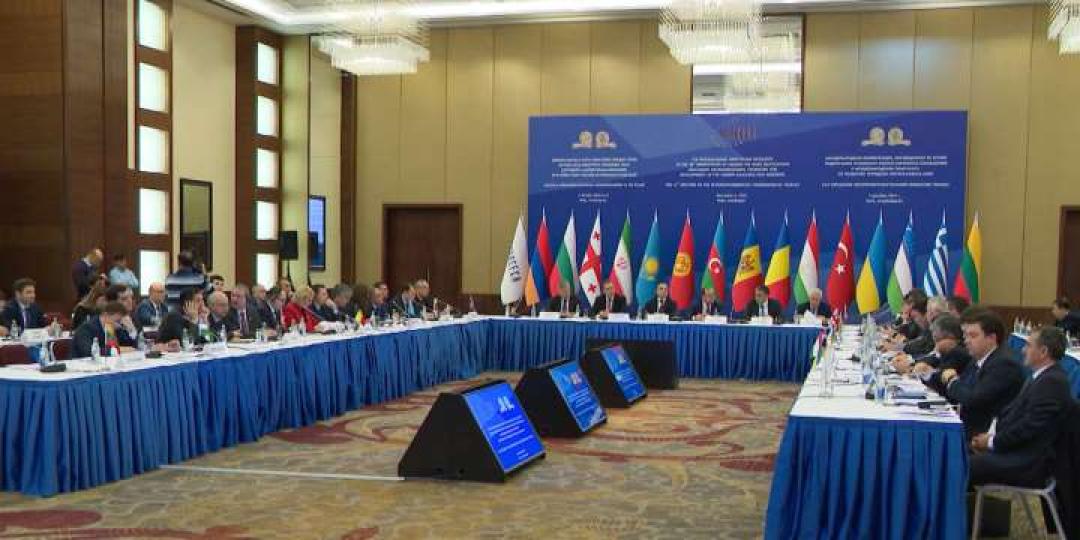
Banter between Azerbaijani and Armenian delegations at the 20th anniversary of TRACECA

On 6 December, the international conference dedicated to the 20th anniversary of the signing of the Basic Multilateral Agreement on International Transport for Development of the Europe-Caucasus-Asia Corridor (TRACECA) was held in the Azerbaijani capital of Baku. The event was attended by representatives of TRACECA and observer countries, as well as international organizations.
The Armenian delegation consisted of Deputy Minister of Territorial Administration and Infrastructures Armen Simonyan, Head of the Division for Technical Policies of the Department of Automobile Transport Policies at the Ministry of Territorial Administration and Infrastructures Arman Karapetyan and Advisor of the Department of Multilateral Policy and Development Cooperation at the Ministry of Foreign Affairs Artem Aznauryan. The entire delegation was personally approved by Armenian Prime Minister Nikol Pashinyan. This was the first visit of an Armenian official since 2017 when the chairman of the Foreign Relations Commission of the Armenian Parliament Armen Ashotyan and deputy Mane Tandilyan attended the conference of the Euronest parliamentary assembly in Baku.
At the event a minor verbal clash occurred between Simonyan and the Azerbaijani Minister of Economy Mikayil Jabbarov, when Simonyan addressed the political protocol of the programme. “We are far away from politicization on these issues. Why should we visit the Alley of Honour? Why has it been included in the program? There were not any thematic political events while the 13th meeting was held in Yerevan. We consider that using such a platform for these purposes is unacceptable. I would like to note that the purpose should not be changed here, all of the steps should be directed to the effectiveness,” he said.
Jabarov responded to this question. “I [believe that] the reaction can be divided into two parts. One of these parts is related to opinions [regarding] TRACECA. I want to start [with the fact] that I understand the reaction of neighbors very well. They have come from Yerevan to Baku… and saw Baku themselves. I understand it is not so easy for them to accept what they have seen. Secondly, we prefer a constructive approach. However, we know destructiveness is easier, more destructive and consequences of this destructive policy are [the first thought] in the neighboring country, which has been isolated from great projects and brought itself to a transportation deadlock, economic deadlock, and does not want to get out of [their situation]. Of course, as in every civil society, when drawing up the social program of the anniversary event, the Azerbaijani side was guided with the aspect of the attitude to the memory of people who had made contributions to the development of the region,” he said.
Jabarov then went on, arguing that next year the 75th anniversary of victory over fascism will be celebrated in Yerevan, while in the city centre still stands a statue of a controversial Armenian World War II figure (Caucasus Watch reported). He also mentioned that an individual social program had been drawn up for the Armenian delegation during the event. “I personally invite you to attend the Heydar Aliyev Center. [There is an exhibition] … dedicated to the history of the city [of your birth]. That exhibition has been presented to us by our Georgian colleagues from the Georgian Museum where it is [displayed] on a permanent basis. I assure you that you will learn many new things about Yerevan khanate and the foundation of Yerevan city which you can’t read from history textbooks. Of course, if it is of interest to you... As for the TRACECA caravan, despite all counter-attempts, it will go forward,” he concluded.
TRACECA is an international transport programme involving the European Union and 14 member States of the Eastern European, Caucasian and Central Asian region, formed in 1993. The programme aim is to strengthen economic relations, trade and transport in the regions of the Black Sea basin, South Caucasus and Central Asia. It has a permanent Secretariat, originally financed by the European Commission, in Baku, Azerbaijan, and a regional office in Odessa, Ukraine. Since 2009 the organisation has been entirely financed by member countries.
See Also


Mirzoyan Meets US Deputy Assistant Secretary Joshua Huck

Azerbaijani President Holds Talks with UAE and German Business Delegations on Economic Cooperation

Grigoryan Confirms Armenia’s Readiness to Dissolve OSCE Minsk Group Upon Peace Treaty Signing

Azerbaijani Official Warns of Ecological Risks to Caspian Sea, Similar to Lake Urmia and Aral Sea

